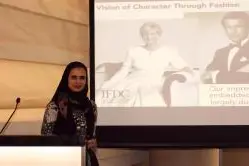PHOTO
Dubai, 21 January 2015: Our fashion sense, or the lack thereof, has the ability to make us a little more or less intelligent!
This was just one of the many nuggets of valuable information presented by the Islamic Fashion and Design Council (IFDC), during its presentation at the Dubai Shopping Festival/Abbati event at the Armani Hotel in Dubai, United Arab Emirates, yesterday.
Speaking on the vast number of messages that are conveyed through our clothing and colour-choices, Alia Khan, the Chairwoman of the IFDC, explained that colour and wardrobe selection not only had the ability to influence our moods, but even the way in which we think and behave.
"It may sound odd, but it's true," said Khan. "There are numerous studies done on the effects of fashion and colour, and some of the results are very interesting. Take Barbara Fredrickson's experiments pertaining to the influence of clothing on cognizance and intelligence. Fredrickson discovered that when she gave a maths test to groups of women and men who wore either a swimsuit or a sweater, those wearing a swimsuit exhibited a diminished maths performance. So what we wear can even effect our IQ!"
"And that's not all. Every time we pull something from the wardrobe, or try on something in a store, this has life-changing potential. Researchers from Northwestern University in the US showed that what we wear can actually change the way our brains function. When participants of a study were given a white coat to wear, and told that it was a doctor's coat, they showed improved mental agility, as well as precision and attention to detail. By associating the white coat with a doctor, their brains were actually primed to take on different mental capacities."
In Khan's presentation, she also highlighted that fashion psychologists have established the winning combination is always "slick, clean, and graceful"... something that has been the defining feature of Islamic Fashion from the beginning. "So essentially, you can never go wrong when you choose to grace yourself with Islamic fashion!" says Khan.
Khan's presentation looked at a number of different topics influenced by Islamic fashion, including the effect of colour on the subconscious mind, as well as the importance of value-setting, and how this has influenced the international fashion industry. "If you look at your favorite personalities that have influenced you over the years, I can guarantee you their dressing sense had a big impact on your perception of them".
"Being aware of your goals and values - knowing them not only from a general point of view, but really knowing the detail of what you want to achieve in life and how you will set about doing this, can mean the difference between absolute success and near-miss failure," said Khan. "Look at one of fashion's greats - Coco Chanel. Her vision was clear, she knew exactly what her brand was to be like, look like and more importantly, feel like. And today, Chanel is one of the industry greats, known internationally for its sense of style, grace and elegance."
An expert on Islamic fashion (iFash), Khan also explained the journey mainstream fashion has taken over the years through trends expressing issues such as gender equality through masculine, power-dressing in the 80's. She compared this with iFash, and its contrast in continually maintaining grace and elegance through modest fashion choices and styles.
"Mainstream fashion seems to have come full-circle, where it struggled through this trend and that, but now finally seems to understand the power of grace and elegance, which iFash knew all along", she said. "It is this strength and power that has been ever-present in Islamic fashion. With iFash, we always knew and understood that femininity, grace, and elegance is powerful.
Furthermore, iFash is more about freedom not oppression. Becaue we don't fall into the trap of trends, fashion forecasts, and best dressed lists, iFash designers and consumers never have to worry about what the latest colors, cuts, and patterns are ... unlike mainstream fashion, they do not have to face such pressure; only appreciation of creativity irrespective of what mainstream dictates in "in"...to escape this trap feels good!"
The presentation was well-received by visitors to the Abbati event, who commented on Khan's positive and fresh approach to Islamic fashion, and the deeper look into the psychology behind fashion. Khan will be presenting on the same topic later this month, as she represents IFDC at the ISWEN (Islamic World Entrepreneurs Network) conference in Paris, France on 31 January.
© Press Release 2015




















